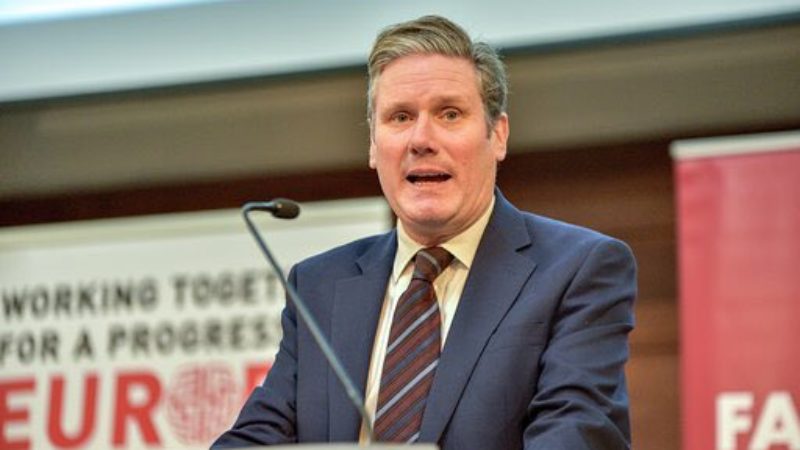
Keir Starmer has set out a vision for what he describes as a “contribution society” based on people “being part of something bigger, playing your part, valuing others not just because of what they can offer you”.
In a pamphlet published by the Fabian Society, the Labour leader has said people want to see the country “capture the spirit that saw us through the worst ravages of the pandemic and celebrate the idea of community and society”.
Starmer’s essay, The Road Ahead, declares that Labour would “build an effective partnership of state and private sector to prioritise the things that we have seen really matter”. It proposes “ten principles for a contribution society”:
- “We will always put hard-working families and their priorities first;
- “If you work hard and play by the rules, you should be rewarded fairly;
- “People and businesses are expected to contribute to society, as well as receive;
- “Your chances in life should not be defined by the circumstances of your birth – hard work and how you contribute should matter;
- “Families, communities and the things that bring us together must once again be put above individualism;
- “The economy should work for citizens and communities. It is not good enough to just surrender to market forces;
- “The role of government is to be a partner to private enterprise, not stifle it;
- “The government should treat taxpayer money as if it were its own. The current levels of waste are unacceptable;
- “The government must play its role in restoring honesty, decency and transparency in public life;
- “We are proudly patriotic but we reject the divisiveness of nationalism.”
The essay reveals that a Labour government would aim to “repair the public finances”, “fix the holes in the shoddy Brexit deal” and rethink “how government and business interact” to make Britain “the best place to do business”.
Starmer promises to “sign into law” a ‘new deal for working people’, replace Universal Credit to “ensure that work pays” and put “huge investment in a green recovery” – aiming to “eliminate the substantial majority of carbon emissions by 2030”.
He pledges also to set “ambitious targets” for mental health treatment and “transform” health with “the power and potential of technology”, and to reject a “narrow focus on university education” while equipping all young people with “soft skills”.
On crime, the Labour leader endorses:
- a new law aimed at ending street harassment;
- increasing sentences for rapists and stalkers;
- introducing whole life tariffs for anyone found guilty of the rape, abduction and murder of an individual;
- a review to increase sentences for domestic murder;
- providing new statutory protection for domestic abuse survivors and real action to tackle misogyny;
- giving victims of persistent, unresolved anti-social behaviour the same rights as victims of crime.
Commenting on the publication of the paper today, Starmer said: “People want to emerge from lockdown into something better. Our country is now at a crossroads: down one path is the same inequality of opportunity and insecurity.
“The Labour path is about building a better future for working people. Labour will build a society that prizes the contributions people make, providing security and opportunity across Britain.”
The almost 12,000-word essay comes ahead of the first in-person party conference since Starmer was elected as leader last year. Labour members will head to Brighton on Saturday for the start of the five-day gathering.
Fabian Society general secretary Andrew Harrop has described The Road Ahead as presenting “ambitions for a Britain that works for workers and businesses and that puts families and communities in control”.
“The Labour leader’s vision of a ‘contribution society’ has the power to unite people from every background who want to see equality, security, responsibility and collective action back at the heart of British politics, in place of individualism, selfishness and free-market dogma,” Harrop said.
“The Fabian Society looks forward to working closely with all parts of the Labour movement to develop the policies needed in the post-pandemic world to bring to life this exciting and ambitious prospectus.”
Starmer has confirmed days before conference that he wants to bring rule changes for a return to an electoral college system for leadership elections, a new reselection process for MPs and reforms to the policy-making process.
The proposals have sparked a row within the party, particularly the move to scrap the one-member-one-vote system for electing leaders, introduced by Ed Miliband in 2014, in favour of a return to an electoral college model.
Starmer has reflected on the history of Labour in the pamphlet, arguing that “the last 75 years of Labour history have been characterised by towering achievement in government followed by long periods of self-doubt and navel-gazing”.
The leader has written that the legacy of the last Labour government has “become contested to the extent that the party has at times felt like separate families living under one roof” and described this as “harmful and alienating”.




More from LabourList
Nudification apps facilitate digital sexual assault – and they should be banned
Diane Abbott suspended from Labour after defending racism comments
Labour campaign groups join forces to call for reinstatement of MPs